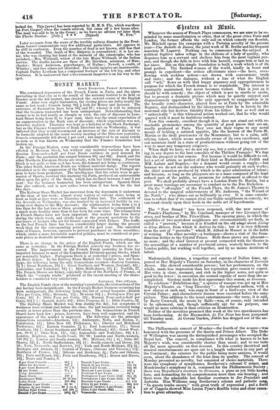f4tairti 331usit.
Whenever the season of French Plays commences, we are sure to be re- minded by some manifestation or other, that of the great cities Paris and London, the former affords the only soil on which comedy can flourish. Mr. Mitchell opens his campaign with a Parisian novelty of the present year—Uue Balaille de Dames, the joint work of M. Scribe and his frequent associate M. Legarve. Nothing can be commoner than the subject. A political fugitive takes refuge in the chateau of a lady of quality, who disguises him as a servant and shelters him from the most vigilant pur- suit, and though she falls in love with him herself; resigns him at last As her niece. But on this simple foundation is built a work which is of its kind perfect. The finished woman of the world, kindly in heart and prompt in expedient—the artless affectionate niece —the hero, over- flowing with reckless ardour—are drawn with consummate truth and taste ; and the dialogue, without a line of what the English call "wit," flows on with that happy piquancy and appropriateness to purpose for which the French drama is so remarkable. The interest is constantly maintained, but never becomes violent. This is just as it should be with comedy ; the object of which is not to startle or excite, but to present a dramatic picture which may be quietly enjoyed and dispassionately appreciated. The only approach to exaggeration is in the broadly comic character, played here as at Paris by the admirable Regnier, and distinguished by the idiosyneracy that he is heroic by the maternal side but derives timidity from his father. But so well and sa " unfarcically " is this whimsical notion worked out, that he who would quarrel with it must be fastidious indeed.
Now this comedy, excellent though it is, does not stand out with re- markable prominence among the quantity of good pieces that are an- nually produced at Paris. They owe not their vogue to any novel means of tickling a satiated appetite, like the horrors of the Porte St. Martin or the droll pruriencies of the Montansier, but to a calm, self- relying talent, which seems modestly aware of its own excellence, and can maintain itself in a state of productiveness without going out of the way to meet any temporary exigency.
When shall we have we do not say one, but a series of plays, answer- ing in any degree to the best comedies of the Theatre Francais? We fear that the prospect is but remote. Not because it would be difficult to col- lect a set of artists as perfect of their kind as Mademoiselle Judith and MM. Lafont and Regnier,—for a demand would create a supply,—but because we do not see the audience who would patiently sit such works; the chief sensation produced by which is the quiet admiration of. talent and because, so long as the playgoers are as a mass composed of the least refined part of the public, no premium for refinement is offered to the poet. We shall probably always have a London Porte St. Martin, but a great many turnings are necessary to conduct us to the Rue Richelieu.
On the "off-nights" of the French Plays, the St. James's Theatre is devoted to the magical achievements of Mr. Anderson, "the Wizard of the North " ; who shines out as brilliantly as ever. It is some consola- tion to reflect that if we cannot rival our Gallic neighbours in comedy, we can tread closely upon their heels in the noble art of legerdemain.


























 Previous page
Previous page